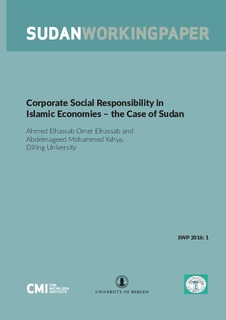| dc.contributor.author | Elhassab, Ahmed Elhassab Omer | |
| dc.contributor.author | Yahya, Abdelmageed Mohammed | |
| dc.date.accessioned | 2018-01-04T08:22:37Z | |
| dc.date.available | 2018-01-04T08:22:37Z | |
| dc.date.issued | 2016-05-01 | |
| dc.identifier | oai:www.cmi.no:5806 | |
| dc.identifier.citation | Bergen: Chr. Michelsen Institute (Sudan Working Paper no. SWP 2016:1) 16 p. | |
| dc.identifier.isbn | 978-82-8062-588-5 | |
| dc.identifier.issn | 1890-5056 | |
| dc.identifier.uri | http://hdl.handle.net/11250/2475337 | |
| dc.description.abstract | Introduction
Since the 1950s, there has been a growing international awareness of the need for business organizations to commit to a social role that goes beyond the sole objective of profit maximization. The term “corporate social responsibility” (CSR) refers to strategies whereby corporations or firms conduct their business in a way that is ethical, society friendly, pro-environment and beneficial to communities in terms of development. According to Carroll (1979, 499), whose definition has been widely accepted, CSR can be defined in terms of four expectations, framed based on economic, legal, ethical, and discretionary responsibilities.
Economic responsibility is for the business to be, first and foremost, profitable and viable.
Legal responsibility is to obey the laws and regulations of the land.
Ethical responsibility covers society’s expectations of business over and above the legal requirements—responsibilities that embody ethical norms, which are not necessarily codified into law.
Discretionary (philanthropic) responsibility is the expectation that the firm will assume social roles over and above those already mentioned and caring for and investing in the society in which it operates.
CSR would seem to fit well with basic principles operating in Islamic-based economies like that of Sudan. Banning interest, shunning unlawful business investments, staying away from unclear or suspicious transactions, and above all, being oriented towards social justice and economic equality are main principles which underlie the claims of such economies to being distinctively Islamic.
These were also the principles upon which a number of development corporations (DCs) were established in South Kordofan State (SKS). The area is located at the border with South Sudan (which achieved its independence in 2011), and has been heavily affected by civil war. Driven by religious ethics and values, the corporations are expected | |
| dc.language.iso | eng | |
| dc.publisher | Chr. Michelsen Institute | |
| dc.relation | Sudan Working Paper | |
| dc.relation | SWP 2016:1 | |
| dc.relation.ispartof | Sudan Working Paper | |
| dc.relation.ispartofseries | Sudan Working Paper SWP 2016:1 | |
| dc.relation.uri | https://www.cmi.no/publications/5806-corporate-social-responsibility-in-islamic | |
| dc.subject | Economy | |
| dc.subject | Corporate Social Responsibility | |
| dc.subject | Islam | |
| dc.subject | Ethics | |
| dc.subject | Philantropy | |
| dc.subject | Sudan | |
| dc.title | Corporate Social Responsibility in Islamic Economies – the Case of Sudan | |
| dc.type | Working paper | |
